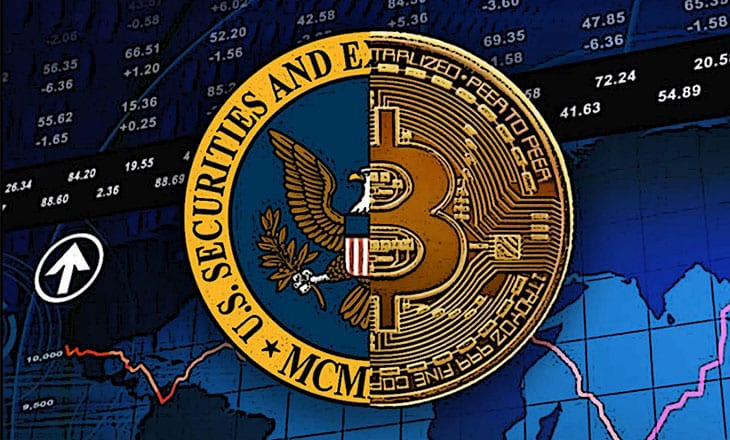If Bitcoin enthusiasts cling to one thing that they believe will catapult BTC valuations back to the superior heights of old, it is the approval by the SEC of a Bitcoin Exchange-Traded Fund (ETF). The SEC, however, has been unwavering its refusal to go to this next step, citing that it is “uncomfortable” with the status of the Bitcoin market to date and with the shortcomings of the unregulated network of crypto exchanges spread across the planet. It has passed on over a dozen applications in the past two years, and it is now contemplating a new proposal for the VanEck/SolidX Bitcoin ETF that would supposedly be listed on the CBOE’s BZX Equity Exchange.
The SEC has announced that it “would shortly be commencing the formal countdown period to approval or disapproval of the product, soliciting feedback from the public.” To date, there have been seven comments submitted, and all but one contains negative sentiments.
The “VanEck/SolidX” application had been submitted originally back in early January, but it had been withdrawn when the government shutdown occurred. It was resubmitted at the end of the month, and a new period soon began thereafter for the registering of public comments on the prospective rule change being contemplated by the SEC. The flavor of the seven comments thus far on the record offer a glimpse of what goes on behind the scenes when a new innovative idea threatens to re-shape competitive market dynamics in an industry.
Under such circumstances, it is not unusual to witness overt “stalling tactics”, employed by the industry participants that feel unprepared for change. A response from a D. Barnwell echoes these sentiments: “I would ask the SEC […] to take a ‘watch and wait approach’ […] [t]he true game changer is the underlying technology Blockchain, not the cryptocurrency. And to make inroads into this industry-changing technology, one does not need to have a financial product based on the cryptocurrency.”
The other negative comments espouse old arguments that cryptocurrencies have no intrinsic value and that the mining industry that supports the crypto ecosphere “works like a moat around the castle of bitcoin mining, keeping us away from the reality of bitcoins.”
Questions were also raised as to whether cryptos were even a viable financial product and that volatility to date has been caused by price manipulation “by the very few.” This latter complaint refers back to previous public messaging from Jay Clayton, the chairman of the SEC. In the past, he has expressed major concerns over price manipulation in the Bitcoin market, especially from overseas, and the lack of adequate monitoring software in the crypto exchange industry to detect such machinations.
Not all comments, however, were in a negative, “stalling” vein. Sami Santos on March 12 responded by speaking to prior concerns over investor protection: ““[Disapproval of] an ETF because of manipulation and […] the protection of investors is contradictory, because without an investment fund the investor is susceptible to buy bitcoins in deregulated exchanges and lose their investments.” He further notes that VanEck “offers insurance to cover possible losses.”
He then argues that an ETF on principle alone would enhance security in the market by providing much more “liquidity, transparency and safe custody of assets that will have credibility for large investors.” Clayton had also cited the lack of proven crypto exchange custodial services, which are standard procedure at all traditional equity exchanges, as another issue preventing the agency from acting in the affirmative.
Over the last year, however, there have been great strides made in all areas by the likes of Fidelity Investments in the custodial services arena, by the Nasdaq in its sharing of modern monitoring software to detect potential price manipulation offenses, and by the advent of “state-of-the-art” exchanges like Bakkt and ErisX. Recent research has also revealed that BTC transaction volumes are primarily concentrated in the U.S. market, where most exchanges act in compliance with regulatory standards. The SEC had said that it was troubled that international trading volumes outside of the U.S. borders could unduly impact BTC pricing, but even this concern seems to be dissipating with time.
The SEC announced Friday that it will extend its 45-day review period to 90 days for is rule decision related to the VanEkt/SolidX application. The new date will be May 21, but it should also be noted that Clayton seems to be softening, as far as his previously stated concerns go. He has recently noted that there “may be a case where a Bitcoin ETF could satisfy our rules.” He is not as dismissive of the underlying technology, as well: “[It is] demonstrating significant promise in the places where it’s consistent with our approach to capital raising in the past.” The SEC is also reviewing current custodial arrangements in the digital asset space, as for compliance with existing custody rules.
